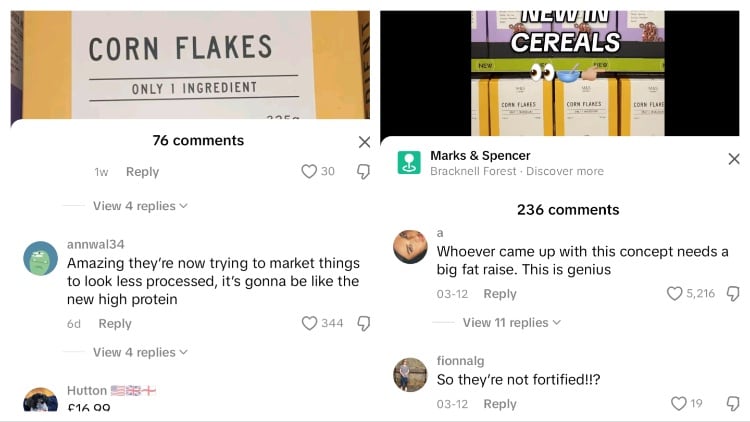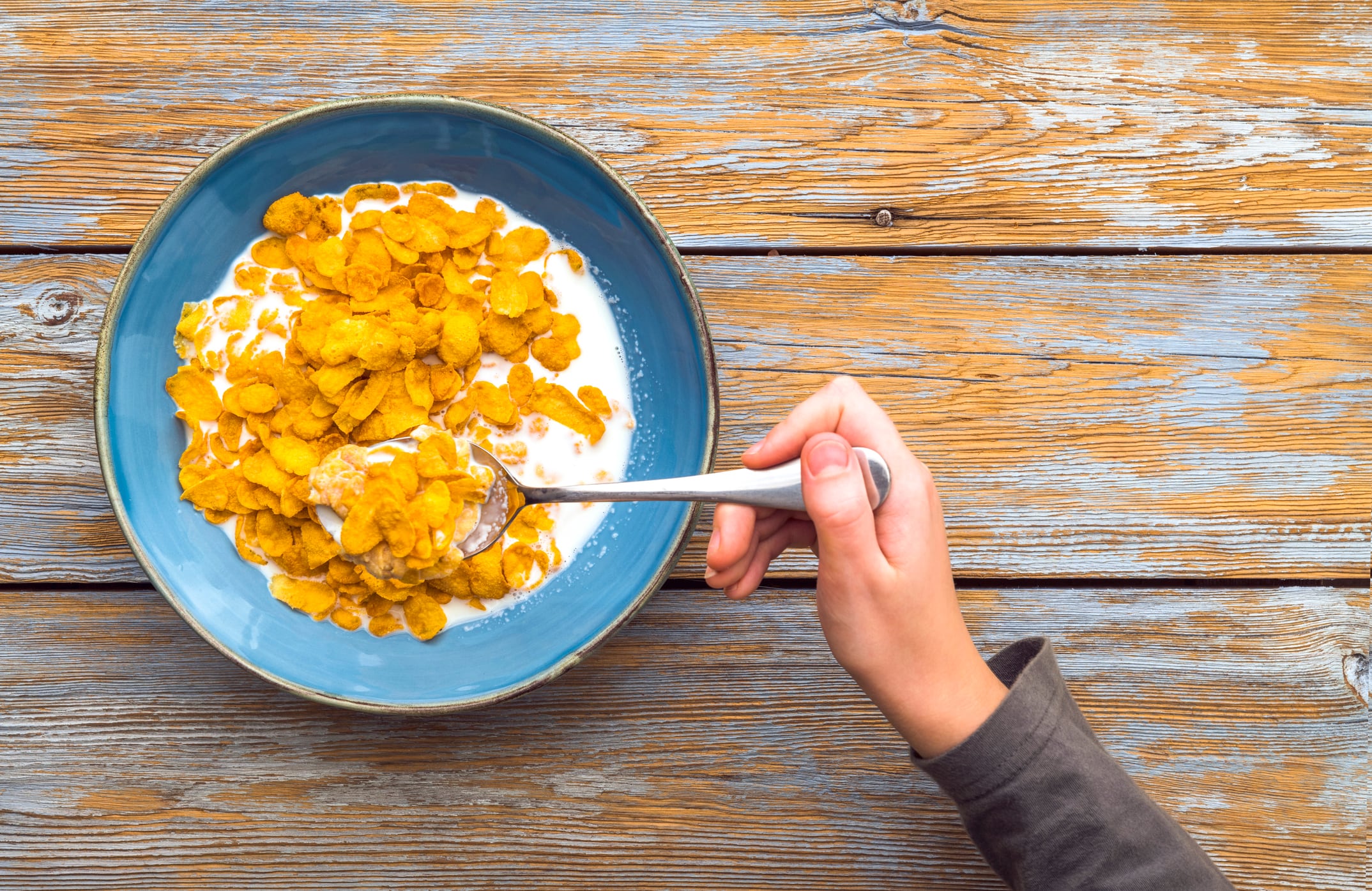The ‘Only…Ingredients’ portfolio features a pack of 4 White Rolls with 5 ingredients, alongside a trio of cereals including its Choco Hoops with 6 ingredients, Multigrain Hoops with 5 ingredients, and Corn Flakes with 1 ingredient.
What M&S has done isn’t strictly new – the original Shredded Wheat has been a one ingredient breakfast option since its inception in 1893, whilst the clean label movement (associated with shorter ingredients lists) has been bubbling away in the background driven by increasingly health conscious consumers.
But there’s no doubt that this move has captured a lot of attention.
It’s the design of the M&S cereal which has made it stand out – an approach similar to the US-based RX Bar, which has been labelling its ingredients in bold text front-of-pack since 2013 and saw it gain huge success across the pond.
Consumer and industry reaction
Whilst the entire M&S range has sparked discussion, it’s the Corn Flakes that have been cast firmly into the spotlight.
Social media was quick to pick up on the new launch with consumers offering mixed responses.
“Whoever came up with this concept needs a big fat raise. This is genius,” TikTok user ‘a’ wrote.
While another post by ‘annwal34’ read: “Amazing they’re now trying to market things to look less processed, it’s gonna be like the new high protein.”

Meanwhile, handle ‘angietok0’ wrote: “See what happens when we refuse to buy ultra processed,” starting a muddled debate over what UPF constitutes in the comments.
And it’s not just consumers who are discussing the M&S launch, with LinkedIn filled with a frenzy of comments from the business community. Again, the response has been varied, with some saying it’s a step in the right direction and others expressing concerns.
Sunna van Kampen, founder of supplement brand Tonic Health, said the move reflected great industry progress.
“Consumers are waking up to the reality of what they’re eating, and brands are starting to listen,” he wrote on Linked In following the launch. “Well done Marks and Spencer!!”
Ellie Grubb, marketing manager for Novo Farina, agreed, telling Food Manufacture that the pea protein manufacturer business is a “big fan” of the 1 Ingredient M&S Corn Flakes.
“The simplicity of the packaging, product development and ingredient deck really make for a strong case towards the exact movement we’re appealing to – keeping food simple, healthy and less complicated,” she said.
“[It makes] it simpler to choose healthier options without bamboozling consumers with long, hard to understand ingredient declarations.”
She described the use of front-of-pack ingredient labelling as a smart move and possibly a game-changer for plant-based products which have been pulled into question following conversations around UPFs. In other words, players in this category could use the same technique to mark themselves out from the crowd in future.
Fortification concerns
While the M&S rolls are subjected to the UK Bread and Flour Regulations 1998 which mandate that four vitamins and minerals must be added to all white and brown flour (calcium, iron, thiamine (Vitamin B1) and niacin (Vitamin B3), there is no comparative rule for cereals. And it’s the decision not to fortify these cereals that has led to criticism from some.
“I don’t think this is progress,” registered nutritionist Asita B shared on Linked In. “Cereal is what most kids in the West start their day with. It’s devoid of nutrients. Therefore, the producers add lots of vitamins and minerals to make up for it.”
“Developers have forgotten their food history,” Ruth Dolby, director at Food Science Fusion, told Food Manufacture. “Fortification in breakfast cereals was successfully lobbied for by the senior nutritionists of the time and recognised as necessary to compete with the traditional cooked breakfast from a nutritional view. This worked well until the sugars/chocolates/oiled vine fruits were added for ‘palatability’.”
“The UK retailer M&S’s clean label cereal initiative is a step in the right direction, catering to consumers seeking shorter, more recognisable ingredient lists. However, what’s not on the label is just as important as what is," added the Clean Label Project’s executive director, Jaclyn Bowen.
“Nutrient fortification, for example, plays a key role in public health, and its absence in some clean label products raises questions about nutritional adequacy.”
Cherrelle Beckitt, founder of The Family Food Co., agreed, questioning the removal of fortification whilst charging more for the product.
The 1 Ingredient Corn Flakes retail at £2.65 and come in a 325g box, while its original own brand Corn Flakes retail at 90p in a 500g box (that’s 82p vs 18p per 100g respectively).
“While the clean eating trend has its place, removing important nutrients from products that many families rely on for balanced nutrition feels like a step in the wrong direction,” Beckitt wrote on Linked In, as she pointed to many fortified cereals in the UK offering children as much as 20% of their daily iron needs.
‘This will shift the dial’
Tonic Health’s van Kampen agreed fortification is important, adding that, in actual fact in an ideal world, everyone would scratch cook their breakfast, but said the launch represented an important step.
“What M&S has done is made themselves incredibly transparent and accountable,” he continued. “You could argue it’s a marketing gimmick. [But] I think they’ve actually made a step forward.”
He told Food Manufacture that the reality is that a parent is unlikely to pivot to whipping up eggs and avocado for their child’s breakfast every day; but what this move may mean is that other companies are likely to make similar changes, such as reducing sugar content even further. Overall, he believes that will have a positive impact on people’s health.
“It’s about those little changes for me that really will shift the dial in the long term,” he noted.
Leo Campbell, creator of the Superloaf which has been called the ‘world’s first healthy UPF' agreed, suggesting that the criticism is short-sighted.
“Food system transformation doesn’t happen overnight, it requires a transitional process – and the seismic shock that M&S’s ‘6 or fewer’ range has sent through the UK’s food manufacturing industry shouldn’t be underestimated,“ he said.
“By leveraging their unique control over recipes, they’ve forced suppliers to clean up ingredient decks against their instincts, setting a new industry benchmark. And that’s the foundation for a longer-term push to drive real change in health and nutrition – with their commitment to products like Superloaf helping to lead the way.”
Copycats likely
Looking ahead, van Kampen believes we are likely to see other retailers follow in the footsteps of M&S and said he envisions the momentum around UPFs continuing.
“It’s a mega trend that’s here to stay,” he said.
“The next five years is going to be incredibly interesting in the food industry. The beauty of food and drink is that retailers are hyper competitive, they’ll kick anything out and put anything new in if it sells – and that’s what we’re seeing now.”
"It will be interesting to see how UK consumers respond to this approach — and whether it influences the broader industry’s perspective on what truly defines a ‘better-for-you’ product," agreed Bowen.
The launch of the clean label range follows shortly after M&S’s release of its ‘Brain Food’ portfolio, which includes granola, smoothies and snacks including its Mixed Berry Bars and Brain Ball.


